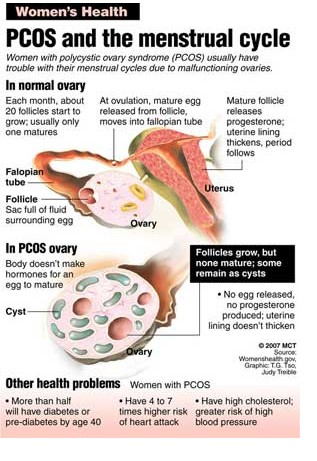

 The cause of PCOS is unknown. But most experts think that several factors, including genetics, could play a role. Women with PCOS are more likely to have a mother or sister with PCOS.
The cause of PCOS is unknown. But most experts think that several factors, including genetics, could play a role. Women with PCOS are more likely to have a mother or sister with PCOS.With PCOS, women typically have:
• |
High levels of androgens. These are sometimes called male hormones, though females also make them. |
•
|
Missed or irregular periods (monthly bleeding) |
•
|
Many small cysts (sists) (fluid-filled sacs) in their ovaries |
A main underlying problem with PCOS is a hormonal imbalance. In women with PCOS, the ovaries make more androgens than normal. Androgens are male hormones that females also make. High levels of these hormones affect the development and release of eggs during ovulation.
Researchers also think insulin may be linked to PCOS. Insulin is a hormone that controls the change of sugar, starches, and other food into energy for the body to use or store.
Many women with PCOS have too much insulin in their bodies because they have problems using it. Excess insulin appears to increase production of androgen.
High androgen levels can lead to:
• |
Acne |
•
|
Excessive hair growth |
• |
Weight gain |
•
|
Problems with ovulation |
What are the symptoms of PCOS?
The symptoms of PCOS can vary from woman to woman. Some of the symptoms of PCOS include:
•
|
Infertility (not able to get pregnant) because of not ovulating. In fact, PCOS is the most common cause of female infertility. |
•
|
Infrequent, absent, and/or irregular menstrual periods |
• |
Hirsutism (HER-suh-tiz-um) — increased hair growth on the face, chest, stomach, back, thumbs, or toes |
•
|
Cysts on the ovaries |
• |
Acne, oily skin, or dandruff |
• |
Weight gain or obesity, usually with extra weight around the waist |
• |
Male-pattern baldness or thinning hair |
• |
Patches of skin on the neck, arms, breasts, or thighs that are thick and dark brown or black |
• |
Skin tags — excess flaps of skin in the armpits or neck area |
• |
|
• |
Anxiety or depression |
• |
Sleep apnea — when breathing stops for short periods of time while asleep |
Why do women with PCOS have trouble with their menstrual cycle and fertility?
The ovaries, where a woman’s eggs are produced, have tiny fluid-filled sacs called follicles or cysts. As the egg grows, the follicle builds up fluid. When the egg matures, the follicle breaks open, the egg is released, and the egg travels through the fallopian tube to the uterus (womb) for fertilization. This is called ovulation.
In women with PCOS, the ovary doesn't make all of the hormones it needs for an egg to fully mature. The follicles may start to grow and build up fluid but ovulation does not occur. Instead, some follicles may remain as cysts. For these reasons, ovulation does not occur and the hormone progesterone is not made. Without progesterone, a woman's menstrual cycle is irregular or absent. Plus, the ovaries make male hormones, which also prevent ovulation.
Pages to visit for suggestions:
Cysts
Hormones (testing...)
Insulin (about and products to regulate...)
|